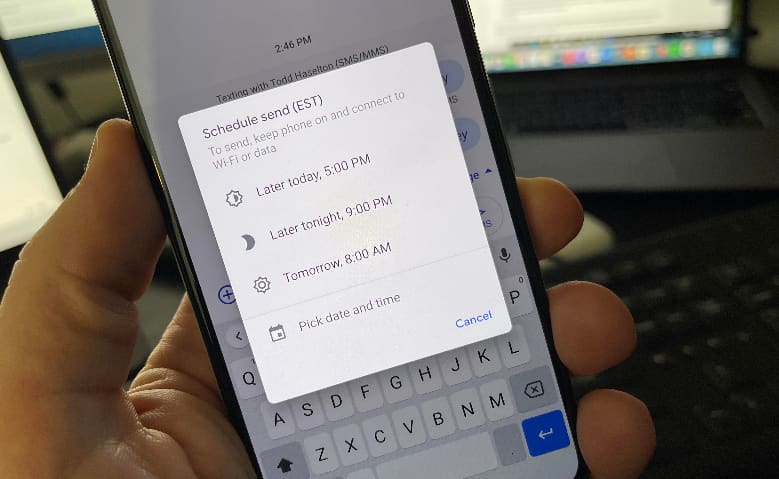What is a backup internet connection?
A backup internet connection serves as a secondary or ‘backup’ connection alongside your primary one, your main connection. Typically, this backup connection remains inactive and may initially seem impractical or unnecessary.
However, since the Internet is crucial for almost every business, any disruption in connectivity can result in significant costs. This is where a backup internet connection, also known as an ‘internet failover solution,’ proves its value by enabling businesses to continue their daily operations seamlessly.
Why businesses require a backup internet connection
Having a backup internet connection, like a 5G failover or a 4G failover, ensures business continuity even in challenging situations, such as network maintenance or internet outages. In scenarios where you need to handle sensitive data or perform tasks critical to your business processes, having no internet connection is not an option.
Therefore, in the event of an unforeseen internet problem, having a backup internet connection for your business allows you to maintain operations smoothly and address any issues with your primary connection simultaneously.
Types of Internet Failover Solutions
4G Failover:
A 4G failover connection serves as a wireless internet backup using 4G LTE bandwidth. With a reliable 4G LTE wireless network covering vast areas, once an outage is detected, your business network will seamlessly switch to the 4G connection.
5G Failover:
5G failover automatically transitions all connected devices to the latest 5G bandwidth, ensuring 100% reliable and high-speed internet access. This method is an excellent way to sustain connectivity with your data and tools, enhancing business efficiency.
Secondary Broadband Connection:
Another internet failover solution involves a secondary fixed-line broadband connection. For instance, if your primary internet connection is a fiber-leased line, you can enhance resilience by adding a backup broadband line.
Choosing the Right Internet Failover Solution:
Regardless of the type of internet failover solution you opt for, it should include the following components at a minimum:
– Primary internet and backup internet connection
– 24/7 dedicated support
– Multiple options (such as 4G, 5G, or DSL) to align with your budget
Vivant provides cutting-edge connectivity solutions, including 4G/5G connectivity, backup internet connections, leased lines, cloud telephony, and Microsoft Teams Phone. Our team will work closely with you to assess your data requirements, primary business goals, and the appropriate level of internet failover solution based on your business setup, financial plan, daily needs, and more.
Top 5 Causes of Internet Outages
Knowing the primary reasons behind internet outages can assist businesses in preparing for potential disruptions. Some of the key causes include:
- Hardware Failures: Failures in modems, routers, or other hardware devices can occur due to overheating, age, or defects. Predicting hardware failure is challenging, but at Vivant, we utilize advanced fixed wireless technology to mitigate the impact of hardware failures on our customers.
- ISP Downtime: Internet Service Providers (ISPs) may face issues like data center failures or fiber cuts leading to outages. While this was a common problem in the past, Vivant has invested in a self-healing software-defined mesh network since 2021, prioritizing critical traffic during outages.
- Power Outages: Disruptions in the power supply can result in a complete internet outage by shutting down all connected devices. Vivant was the pioneer of fixed wireless ISP to incorporate solar-powered UPS backup in installations to reduce the impact of power outages across its network.
- Natural Disasters: Natural calamities such as hurricanes, floods, or earthquakes can damage infrastructure, causing widespread outages. The unpredictable force of Mother Nature could affect all connections, primary and backup, emphasizing the need for a disaster recovery plan to swiftly reconnect your business.
- Cyber-attacks: Ranging from Distributed Denial of Service (DDoS) attacks to malware, cyber-attacks can lead to significant downtime. To enhance protection against sophisticated cyber threats, a multi-layer cybersecurity approach is essential for businesses. Vivant collaborates with top-tier providers to deliver optimal security measures.
5 Benefits of Having a Backup Internet Connection
Enhancing Customer Experience
Customers expect a smooth experience consistently. If they feel otherwise, they might switch to another provider. Customer experience is a crucial competitive factor for 54% of CEOs. Whether customers shop online, seek support, or make digital transactions, a reliable internet connection is vital for a great customer experience.
Moreover, a poor customer experience not only jeopardizes future interactions but also disrupts ongoing ones. In 2022, nearly 90% of payments were digital. For retailers, having a backup connection ensures that they do not lose out on the majority of customer transactions.
Cost Savings
An internet service disruption can significantly impact your finances. Gartner is a global research and advisory firm that provides insights, advice, and tools to help organizations make informed decisions in various aspects of business and technology. Gartner estimates that network downtime costs around $5,600 per minute or $300,000 per hour. For instance, Facebook incurred an estimated $90 million loss during a 14-hour outage in March 2019. Similarly, Apple’s iTunes Store and App Store faced a $25 million loss due to a 12-hour outage in March 2015.
Apart from lost sales revenue, additional costs may include salaries for staff unable to work offline and refunds to customers for unmet commitments. A backup connection eliminates these concerns.
Sustaining Productivity
Whether in an office environment relying on SaaS solutions, video conferencing, or cloud-stored data, or in service-based industries like restaurants or retail, your team depends on the internet to perform their tasks efficiently. A backup connection ensures uninterrupted workflow, enabling them to work towards business objectives and maintain productivity.
Protecting Your Reputation
Service interruptions can hinder meeting deadlines, conducting client calls, or addressing customer queries, potentially damaging your reputation. With a backup connection, your business continues smoothly during emergencies, safeguarding your reputation from any negative impacts of service disruptions.
Enhancing Business Security
To safeguard your network from cyber threats, consistent monitoring, network maintenance, and data backup are essential. However, an internet outage can disrupt these processes, exposing your systems to risks. A secure backup connection ensures continuous operation of security protocols, bolstering your business’s safety.
Creating a Reliable Internet Connection
Internet solutions vary based on individual needs. When aiming to enhance internet reliability, it is crucial to align with your objectives, such as maximizing uptime, swiftly resuming operations post-outages (including natural disasters), optimizing cloud technology performance, ensuring seamless failover between internet connections, and efficiently managing IT resources from budgeting to team allocation. True resilience, akin to genuine love, stems from understanding needs and tailoring strategies to meet them effectively.
Failover Solutions: Ensure Smooth Operations Continuity
In networking, a failover solution serves as a reliable backup. It guarantees seamless operation continuity by seamlessly switching to an alternate connection when the primary one encounters issues. This approach avoids relying solely on a single connection, thus safeguarding your business from interruptions.
How to Select Suitable Backup Internet for Your Business
When deciding on the most suitable backup internet for your business, consider the following factors:
1. Business Location
Cellular connectivity serves as an effective failover solution, with broad coverage from major carriers. Identifying the optimal carrier for your location can be challenging, but Vivant can assist you in this regard.
2. Budget
The cost of backup connectivity should not exceed that of your primary option, as it is not regularly utilized. Determine which operations require critical internet access during outages, assess their speed and bandwidth needs, and allocate your budget accordingly.
3. Speed, Bandwidth, and Reliability
Ensure that the speed, bandwidth, and reliability of your backup internet match those of your primary connection, especially for vital operations. Your backup internet should be dependable in maintaining your business operations without disruption.
4. User Experience
The transition from primary to backup internet should occur automatically and seamlessly. Employees should sustain productivity levels, and customers should not encounter a decline in service quality when the business switches to backup internet.
5. Security
Your backup internet solution should offer the same level of security as your primary connection. With cellular failover, you can utilize a private network to manage devices and data usage securely.
6. Backup Power Supply
Make sure you have a backup plan for power outages in addition to having backup internet. Since internet routers need electricity to function, it’s crucial to have a backup power source to keep connectivity during power outages.




